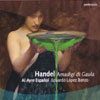Handel Amadigi di Gaula
The glories of Handel suffer badly under this roughshod approach
View record and artist detailsRecord and Artist Details
Composer or Director: George Frideric Handel
Genre:
Opera
Label: Ambroisie
Magazine Review Date: 8/2008
Media Format: CD or Download
Media Runtime: 0
Mastering:
Stereo
DDD
Catalogue Number: AM133

Tracks:
| Composition | Artist Credit |
|---|---|
| Amadigi di Gaula |
George Frideric Handel, Composer
Al Ayre Español Eduardo Lopéz Banzo, Conductor Elena de la Merced, Oriana, Soprano George Frideric Handel, Composer Jordi Domènech, Dardano, Mezzo soprano Maria Riccarda Wesseling, Amadigi, Mezzo soprano Sharon Rostorf-Zamir, Melissa, Soprano |
Author: David Vickers
Handel would not have cherished such abrasive and ugly playing as we hear from Al Ayre Español. Eduardo Lopéz Banzo’s mismanagement of the score is almost constantly frustrating. In particular, string-playing is extreme, hard-driven and overloaded with exaggerated jolting. Following along with the full score of the opera turned out to be a depressing experience; important subtleties and glories are lost from every number.
Banzo and his musicians perform with an absurd lack of sympathy for the musico-dramatic subtlety of ritornelli; lyrical andantes are usually mutated into staccato allegros, and a few places where Handel actually wants such special effects are tastelessly overdone (the appearance of Dardano’s ghost in Act 3, marked Adagio e staccato, is aggressively thwacked). The continuo accompaniment of recitatives is fussy and mangled. The addition of intrusive percussion in the last scene’s sinfonia and concluding chorus is stupid and grossly unstylish.
The singers are uniformly average, and their ornamentation in da capos is frequently bad. Sharon Rostorf-Zamir comes off slightly better as the evil sorceress Melissa. Her showpiece aria “Desterò dall’empia dite” (with solo trumpet) is brash and sassy, although it becomes a mad dash. Banzo’s immature rugby-tackling approach to the music makes a mess of things. Time and again, the music is pushed so hard that there is simply no room for Handel’s personality and warmth to show through. Even Dardano’s “Pena tiranna” is spoilt by being played too loudly (Jordi Domènech’s wobbly timbre does not help either). There are very few bright spots. Oriana’s “S’estinto è l’idol mio” is sweetly done, but Banzo and his band skip through her gorgeous siciliano “Gioie, venite” while somehow managing to avoid its beauty entirely. This performance is devoid of affection and utterly lacking in good judgement.
Discover the world's largest classical music catalogue with Presto Music.

Gramophone Digital Club
- Digital Edition
- Digital Archive
- Reviews Database
- Full website access
From £8.75 / month
Subscribe
Gramophone Full Club
- Print Edition
- Digital Edition
- Digital Archive
- Reviews Database
- Full website access
From £11.00 / month
Subscribe
If you are a library, university or other organisation that would be interested in an institutional subscription to Gramophone please click here for further information.




